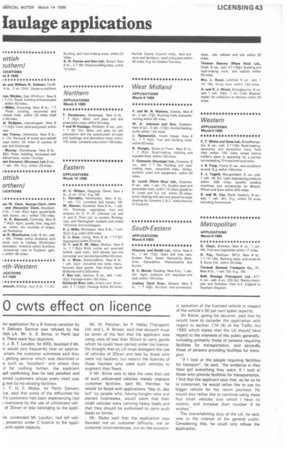cwts effect on licence
Page 45

If you've noticed an error in this article please click here to report it so we can fix it.
An application for a B licence variation by h Delivery Service was refused by the :fish LA, Mr. A. B. Birnie, in Perth last k. There were four objectors.
Ir. J. B. T. Loudon, for BRS, doubted if Mr. a would very frequently hear an applicawhere the customer witnesses said they getting service which was described in is such as "excellent" and where they d for nothing further, the applicant ielf confirming that he had satisfied and ented customers whose every need was g met by his existing facilities.
r, T. H. F. Myles, for Perth Delivery ice, said that some of the difficulties his it's customers had been experiencing had overcome by the use of unlicensed vehof 30cwt or less belonging to the appli )is, contended Mr. Loudon, had left vehpresently under C licence to the appli, with spare capacity. Mr. W. Fletcher, for P. Halley (Transport) Ltd. and L. N. Brown, said that account must be taken of the fact that the applicant was using vans of less than 30cwt to carry goods which he could have carried under his licence. He thought that an LA must disregard the use of vehicles of 30cwt and less by those who were not hauliers, but restrict the licences of those hauliers who used such vehicles to augment their fleets.
If Mr. Birnie was to take the view that use of such unlicensed vehicles merely improve customer facilities, said Mr. Fletcher, he would be faced with applications "day in, day out" by people who, having bought vans and started businesses, would claim that their small vehicles were carrying heavy loads and that they should be authorized to carry such loads on lorries.
. Mr. Myles said that the application was founded not on customer difficulty, nor on customer inconveniences, but on the econom ic operation of the licensed vehicle in respect of the vehicle's 50 per cent spare capacity, Mr Birnie, giving his decision, said that he would have to consider the application with regard to section 174 (4) of the Traffic Act 1960 which states that the LA should have regard to the interests of the public generally. including primarily those of persons requiring facilities for transportation, and secondly those of persons providing facilities for transport.
"If I look at the people requiring facilities for transport", he said, "the evidence is they have got everything they want. If I look at those who provide facilities for transportation. I find that the applicant says that, so far as he is concerned, he would rather like to use his bigger vehicle for the return journeys. He would also rather like to continue using these four small vehicles over which I have no control, and increase their number if he wishes."
The overwhelming duty of the LA, he said, was to the interest of the general public. Considering this, he could only refuse the application.




















































































































